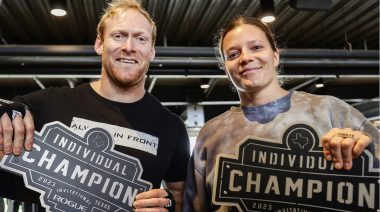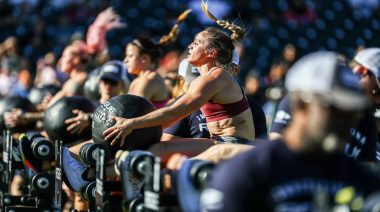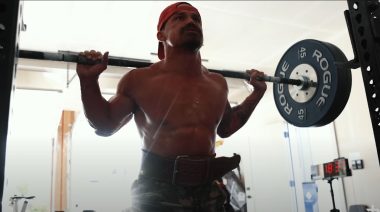Last week we learned about Tucker’s journey from gymnast, to firefighter, to coach and gym owner. But Tucker isn’t just any gymnastics coach, he’s the CrossFit subject matter expert and he leads gymnastics seminars all over the world. In his seminars coaches learn the basics about human body movement and foundational gymnastics movements. Gymnastics isn’t just hard to do; it can be hard to coach, as well. So, lucky for us Tucker shared his expertise on the most common pitfalls of coaching gymnastics.
Tucker first became involved in CrossFit after he opened Global Sports Xtreme (GSX), when a couple of his clients mentioned it to him.
Six or seven months after we had opened, a couple people approached me about CrossFit and if I had heard of it, which I hadn’t. I started looking into it, and we affiliated immediately. It took me about six months to get our box ready, because we had so much previous idea of what we were going to do for fitness installed. We had to redo programming, redo equipment, and redo our whole mindset of what fitness would be, because honestly, we felt like we had latched onto true fitness at that point.
So the end result is, I took all the equipment and sold it to a rehab center in Jackson, Mississippi, and they came down and picked up all of it. And then we literally broke out the welders and started building platforms, GHDs, pull up bars, dip stations – anything that I could build, we built, and the rest of it I bought. So we started with about 2200 square feet, with showers and bathrooms. Then we knocked down a wall and expanded over and built pretty much a complete CrossFit gym.
Tucker and GSX ended up hosting a CrossFit Level I Certification the same weekend they started offering CrossFit classes to the public. That was how Tucker met the people behind CrossFit Headquarters. It didn’t take long before they realized the uniqueness of ex-firefighter, ex-police officer, ex-gymnast Jeff Tucker and hired him on to teach seminars.
According to Tucker, most of what gets taught at his seminars is less about stereotypical gymnastics and more about basic human movement.
We always start with basics. It’s got to start with basics. And that means basic prerequisite strength. If you can’t do a pull up, then you’ve got some more work to do, in my opinion. We want to protect the shoulder girdle. We want to develop good tissue around it and develop good solid movement, and then we can start talking about maybe let’s start kipping and going a little bit more for the time element…So for me, the hard part there is that honestly, in sixteen hours I can’t make a gymnastics coach out of you. In sixteen hours, I can’t make a gymnast out of you. I tell people, that what we can do in sixteen hours is show a plethora of movement that everyone in the room can do.
So I make no illusions about what we’re doing and how we’re doing it. Nobody is certified as a gymnast; nobody is certified as a gymnastics instructor. What they’ve done is passed a certification to now begin a completion of movements that they can start working on it. At least they’re going to be able to go back to their gym and say, “Hey, we know now how to actually cue walking on hands,” or how to scale it. And what does hollow mean, and why is it so important in what we do. I mean, we show how a hollow body position is extrapolated in basically every Olympic movement they do. The hollow position is about contracting the core and we can make it really extreme or more of a bracing. It’s those types of things, those nuggets of gold they get to walk away from and better coaches and better athletes.
When it comes to being a good coach there are elements beyond technical knowledge. Elements that take one from being a good coach to a great coach. Two of those elements, in the mind of Jeff Tucker, are the “coaching eye” and patience.
I think first of all you have to have a coaching eye. What I mean by that is you really do need to be able to look at movement and assess it. You also need to be very honest, and say, “You know, I didn’t really catch that. Let’s redo it,” or, “Let’s video it and I’ll get back to you on it.” Don’t be afraid to say, “I don’t know yet.” So many coaches give an answer for the sake of giving an answer, and I think when I was younger I did that a little bit, too. I’ve learned with age to say, “Hey, we don’t have to answer this right now. Let me video it. Let me dissect it a little bit.”
I think the final most important thing is the hardest: patience. I think you have got to be able to know when to back away, when to tell somebody to stop, when to sit down and have a good cry with somebody, because I’ve seen that. I’ve seen people want something so bad that they really just beat themselves up, and you’ve got to learn to be the patient father-confessor and just sit down and work with people. Because not all people learn at the same speed. Not everyone is visual. Some people are completely over-analytical. Others you have to put a halter on them to tell them to whoa the hell up! You know, it requires a lot of patience.
For Tucker, they gymnastics experience and the coaching eye are there, and the patience has grown over the years. Caring for other people always came naturally. While his path of careers might seem eclectic and unrelated at first, at the core of it all is Tucker’s desire to give to others, to be of service to others, and help people reach their full potential.
There are some people who’ve driven me to want to drink! And I don’t tell them that immediately. I’ll tell them later. But I think that’s hard because of what you do as a coach. I think the best coaches end up not taking time for themselves, because they’re always constantly taking care of other people, constantly.
To learn more about Tucker, read part one our feature interview:
Featured Coach: Jeff Tucker, Part 1 – Cowboy-Firefighter-Gymnast
To follow Tucker’s three weeks of workouts here on Pulse Beat Fit follow this link:






